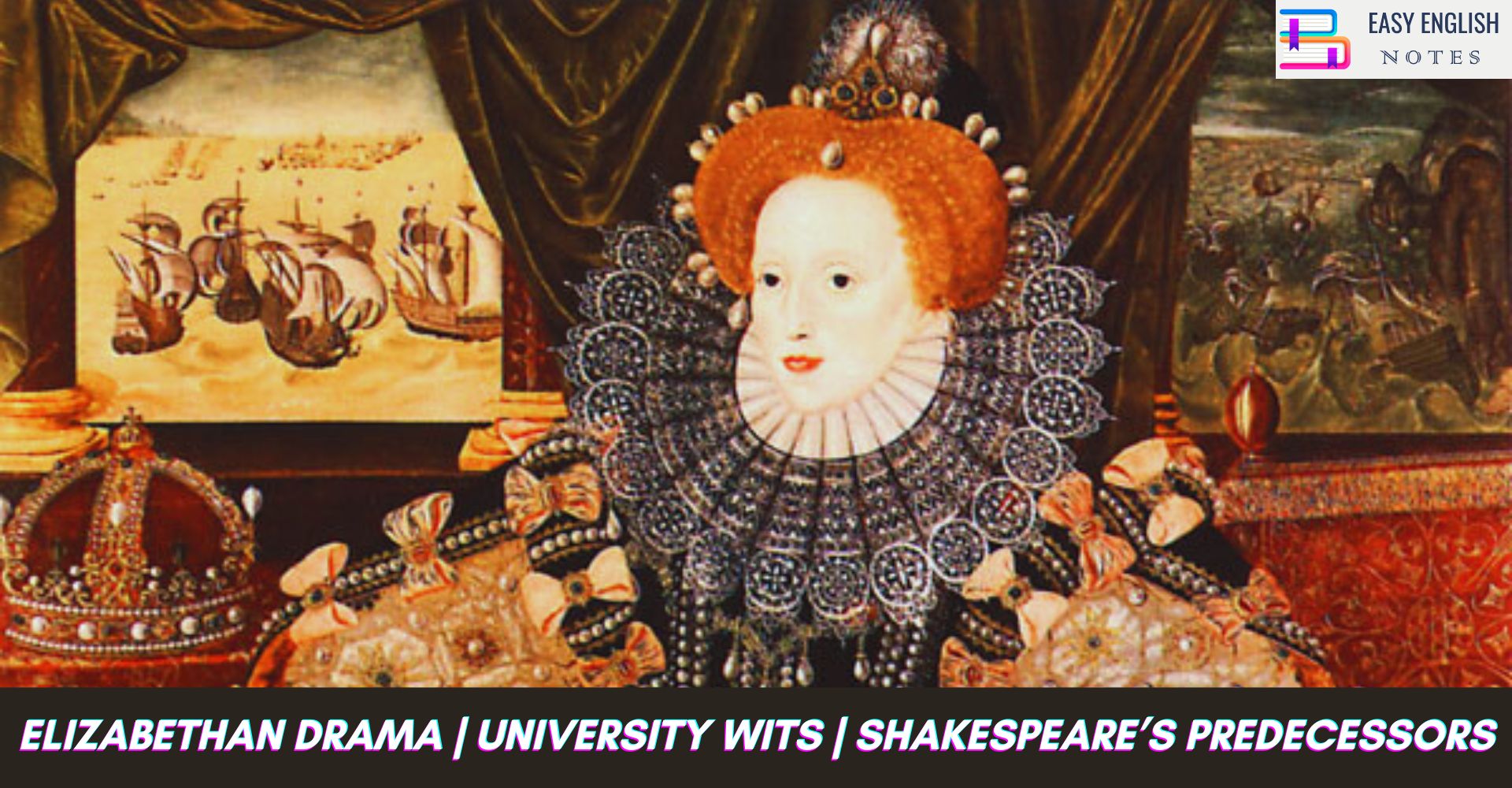The writers of early Elizabethan period were all graduates from the university of Oxford or Cambridge. They were men with learning and talent but with no money. Monasteries were dissolved by King Henry VIII. So, they could not get any employment. Naturally, there was no alternative for them but to seek secular service. In the Elizabethan age teaching was no popular profession. There was no civil service examination. So, these men took to the writing of plays. As they were graduates from university, so they were called university wits. They were gifted men of Bohemian nature. They electrified their plays with Renaissance spirit and the pride of patriotism. The constellation of the university wits consists of stars like John Lyly, Thomas Kyd, George Peele, Robert Greene, Thomas Lodge and Thomas Nash. All of them revolve round the central sun, Christopher Marlowe.
John Lyly occupies the first place among the makers of Elizabethan comedy. His plays have the refinement of tone, polished style, sharp wit and feminine delicacy. All these qualities distinguish them from the popular comedies of gross humour, vulgar witticism and rough mirth. Lyly was a school teacher. He was also a courtier of the queen. His plays were performed by the boy-actors of St. Paul’s and the Chapel Royal. Lyly wrote eight plays in all. His important plays are: “The Woman In The Moon”, “Mother Bombie”, “Sapho and Phao”, “Midas” and “Campaspe”. The plays of Lyly can be divided into three categories- (i) allegorical plays, (ii) realistic plays and (iii) historical plays. Lyly’s plays are the product of his scholarship combined with elegant fancy and somewhat fantastic wit. He fused together prose and poetry, humour and romantic imagination.
Christopher Marlowe was the most important of the University Wits. He wrote about six plays. The most important plays by him are “Tamburlaine”, “Dr. Faustus”, “The Jew of Malta” and “Edward II”. He exalted and varied the subject matter of tragedy. For the Senecan motive of revenge, he substituted the more interesting theme of ambition. “Tamburlaine” deals with ambition for power, “Dr. Faustus” with ambition for infinite knowledge and “The Jew of Malta” with ambition for gold. Marlowe put forward a new concept of the tragic hero. He gave up the medieval concept and revived the Aristotelian concept of the hero with some tragic flaw. He also gave unity to the drama. He reformed chromide plays by giving them both form and characterization. He also enriched blank verse. But his plays have no sound plot. They seem to be collections of heterogeneous scenes. He also lacks humour. However, his influence on English drama was enormous.
Thomas Kyd had neither Lyly’s wit nor Marlowe’s poetry. Yet he is regarded as the father of the popular “revenge tragedy”. “Hamlet” of Shakespeare is the most notable example of this type of tragedy. He is the author of “The Spanish Tragedy”. It is the earliest tragedy in England in which the Senecan motives had been made theatrically effective. The play is melodramatic. But it has a successful wildness, a romantic daring and a certainty in stage effect. Kyd’s contribution to English tragedy is twofold. First he gave a new kind of tragic hero. His tragic hero is neither a royal personage nor a superman. He is simply an ordinary man. Secondly, he introduced the element of introspection in the hero.
Also Read :
- Compare Hamlet with Macbeth, Othello and other Tragedies
- “The Pardoner’s Tale” is the finest tale of Chaucer
- Prologue to Canterbury Tales – (Short Ques & Ans)
- Confessional Poetry – Definition & meaning
Robert Greene wrote about five plays. His best known plays are “Friar Bacon and Friar Bungay” and “The Scottish Historic of James the fourth” He wrote much and recklessly. But his plays are of sufficient merit to find a place in the development of drama. He made notable contributions in plot-construction and characterization. He introduced the heroine disguised as a page, and the blending of the tragic and the comic.
George Peele is of more importance as a dramatist. In his “Arraignment of Paris”, he follows Lyly in employing classical myth freely for courtly purposes. “Edward I” was his ineffective experiment in history. From this play, he turned to the extravagant romantic tragedy “The Battle of Alcazar”. His most important play is “The Old Wives Tale”. This is one of the earliest attempts at a dramatic satire on romantic tales of enchantment and chivalry Peele made no original contribution to English drama like Lyly or Marlowe. But his versatility, his graceful treatment of themes and his command of language combine to give him an honourable place among the lieutenants of Elizabethan drama.
Thomas Lodge and Thomas Nash also contributed occasionally to the growth of English drama. While the only surviving play of Nash is “Summer’s last Will and Testament”, “The Wounds of Civil War” is the single venture of Lodge in the department of drama.
PLEASE HELP ME TO REACH 1000 SUBSCRIBER ON MY COOKING YT CHANNEL (CLICK HERE)











